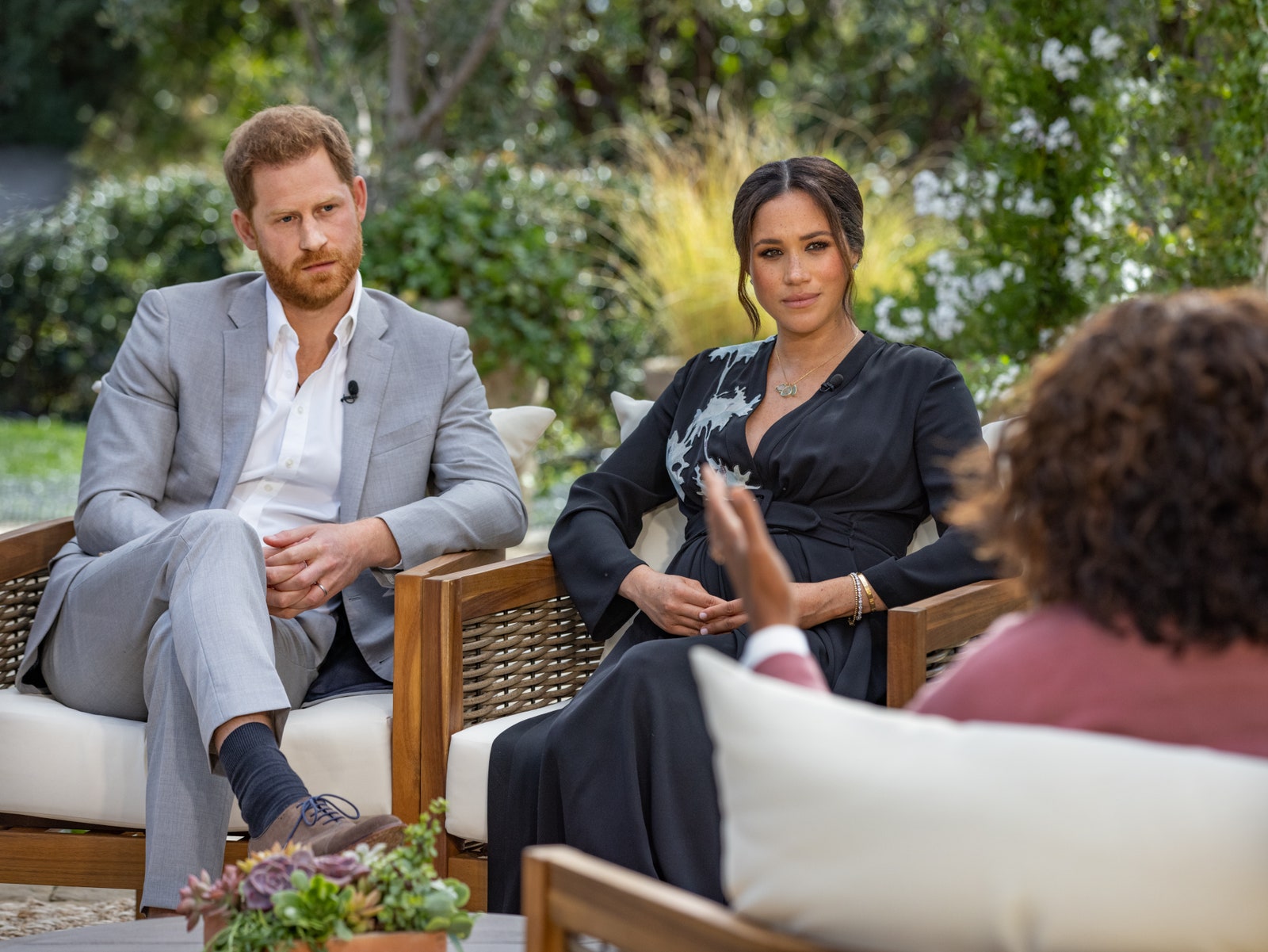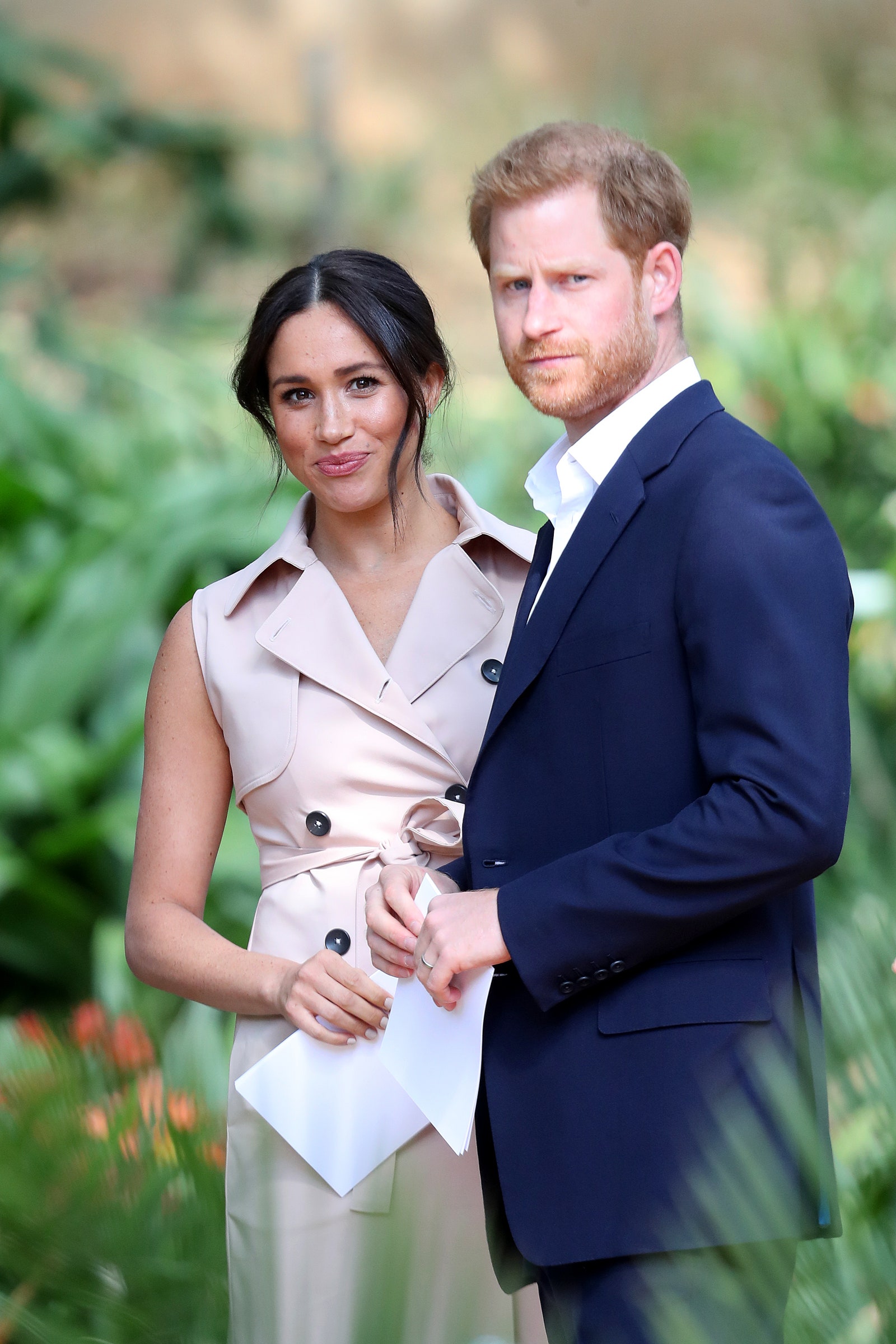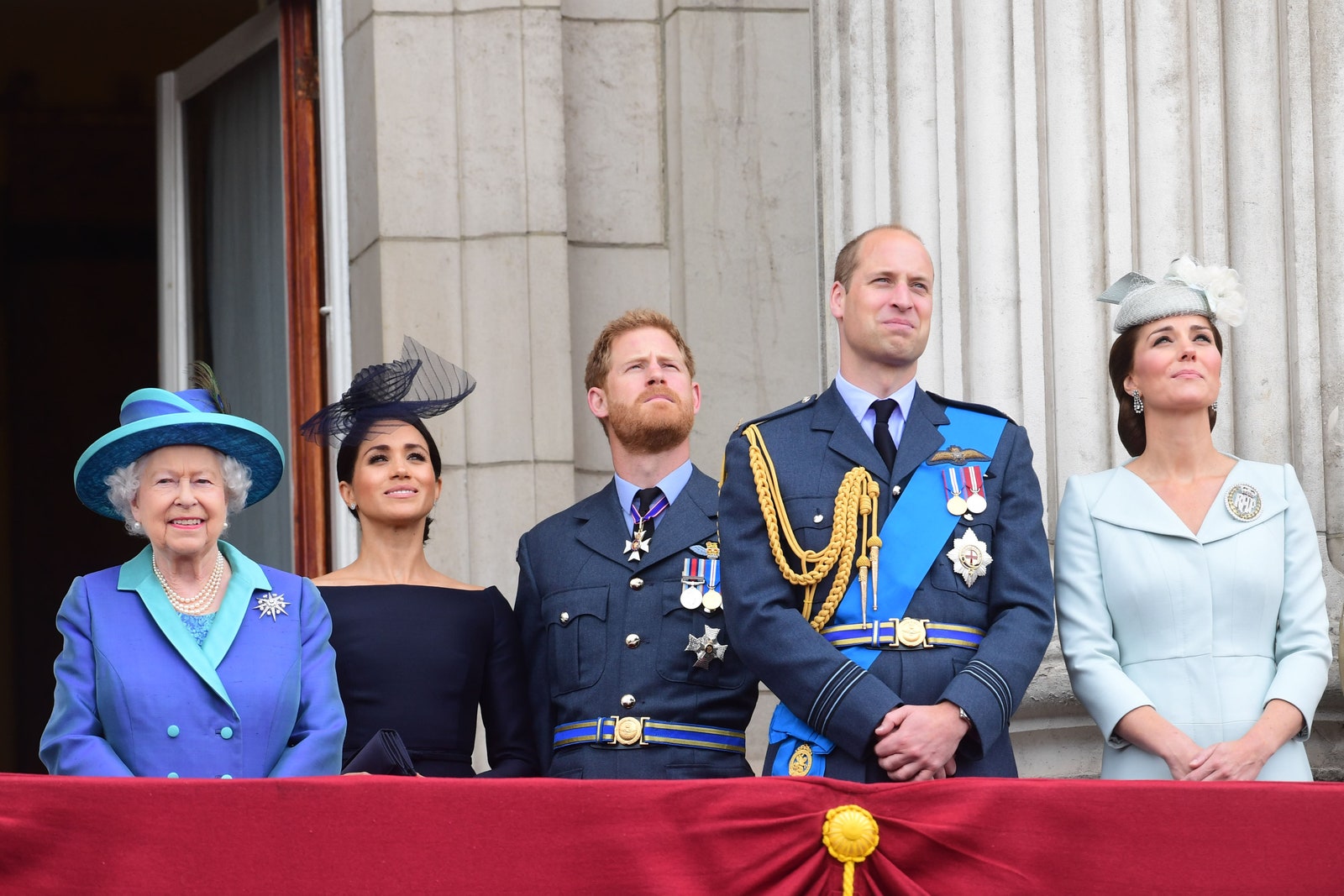Ahead of Megan and Harry’s bombshell Oprah interview, royals expert Omid Scobie says “an entire institution” failed to protect a newcomer.

Meghan Markle Isn’t the Problem
Almost a year ago to the day, veteran royals journalist and Finding Freedom author Omid Scobie found himself alone in a room in Buckingham Palace with Meghan Markle.
The Duchess of Sussex had just completed her final solo engagement as a working member of the royal family, on what was dubbed her and husband Prince Harry’s “farewell tour” of the United Kingdom. It was a meeting with scholars from across the Commonwealth, part of her work as patron of the Association of Commonwealth Universities. A patronage that was taken away from the duchess and returned to Queen Elizabeth II last month as part of Her Majesty’s final decision on Harry and Meghan’s status as working royals.
After everyone left the room that day in March, Meghan said to Scobie, “It didn’t have to be this way.”
According to Scobie, Meghan and Harry never wanted this—to no longer be working members of the royal family. “I hope people realize this is a couple that tried everything they could to make it work before they stepped away,” Scobie says in a new interview with Glamour. “Rather than following the narrative that they just quit because they couldn’t have it their way.”
The problem is bigger than Meghan and Harry, nor did it start with them. It’s the misogynistic way the press—in particular, the British press—treats the women of the Firm who marry into the royal family. And the institution that fails to protect them.
The Duke and Duchess of Sussex sit down with Oprah Winfrey in a tell-all interview set to air Sunday, March 7.
Harpo Productions, Joe PuglieseIt goes back to the 1930s, when Wallis Simpson was described sneeringly as a woman of “limitless ambition” because King Edward VIII abdicated the throne to follow his heart. The behavior worsened in the ’80s and ’90s as Princess Diana and Sarah Ferguson divorced their respective princes. Even Kate Middleton was subjected to those horrible “Waity Katie” headlines in the 2000s. If you’re a newcomer to the family—especially as a woman—you’re put through the paces.
“To see someone so broken in that moment, so upset and vulnerable…,” Scobie remembers of his emotional meeting with Meghan last March. “She was standing in the middle of the palace, and she knew she would never be there again as a working member of the royal family. In that moment you realize it wasn’t just a difficult couple that failed to make it work. It was an entire institution that failed to nurture and protect a newcomer into the fold.”
AdvertisementHe continues, “It’s a problem we see over and over again: Women marrying into the royal family, and they leave battered and bruised. I think that, really, the treatment of women within the royal family, or newcomers, is where the true problems lie.”
***
It’s a problem that will surely be addressed in Oprah Winfrey’s CBS prime-time interview with the Sussexes on Sunday, March 7, for which an explosive trailer aired earlier this week. “I just want to make it clear to everybody there is no subject that’s off limits,” Winfrey says in the clip.
But Scobie predicts the interview will be less about bashing the royal family and more about the couple finally getting the chance to tell their own story now that Meghan’s privacy case against the Mail on Sunday has been resolved (to the tune of a $625,000 victory for the duchess). Scobie, who has covered the work of the Sussexes for years, says a sit-down interview is something the couple have wanted to do for a long time, even when they were still working members of the royal family.
He concedes that the interview's timing is “massively unfortunate" with Harry’s grandfather Prince Philip currently hospitalized. Even so, the decision to do this interview was made before the royal went into care.
“Despite what seems to be a lot of hysterical fear coming from the palace about royal family members being exposed or thrown under the bus, I think this is actually going to be very much about Harry and Meghan’s story,” Scobie says. “I think it will be about their own experiences of being a married couple and working members of the royal family, and what they were up against within the institution of the monarchy.”
The “institution” Scobie is referring to isn't necessarily the individual members of the royal family but rather “the machine that runs alongside them.” It echoes the stories of “the men in gray suits” that Diana spoke about so long ago. “As much as Harry and Meghan tried to make it work within that space, they found they weren’t able to find that happiness or the ability to thrive in that environment,” Scobie says.
The two seem to be thriving now: They've started a new life in California, launched their own nonprofit, Archewell, and signed major contracts with Netflix and Spotify. And, of course, they're expecting baby number two this year.
Advertisement“This is truly the beginning of Harry and Meghan’s next chapter,” Scobie says. “Not being able to share their side of the story in their own words has held them back in some way. This allows them to move on from the pain and the difficulties of the past. The experience of sitting down with Oprah, I would imagine, would have been incredibly cathartic for the couple. Now they’re truly able to focus on the things that matter to them.”
***
In Meghan’s own words, “It didn’t have to be this way.” But how did we get here? On May 19, 2018—the day Meghan married into the royal family—the event was celebrated the world over.
When Scobie began writing what would become the best-selling novel Finding Freedom—released in August 2020—with coauthor Carolyn Durand, he says they intended to tell the story of “a beautiful love story of two people from very different backgrounds meeting and starting what we felt would have been a very exciting legacy as working members of the royal family.” And when he first met the couple, he says Meghan was thrilled to be taking on the role of Duchess of Sussex. Harry, meanwhile, was elated to finally have a partner by his side.
But things took a turn when Harry and Meghan began speaking up about their treatment in the British tabloids. It “fell on deaf ears at the palace,” Scobie says. The institution’s regimented no-comment policy “really damaged Harry and Meghan’s experience as working members of the royal family together. They felt unprotected—unable to protect themselves or each other, especially in Harry’s case, having seen his mother go through very similar things.”
After their son Archie’s birth, in May 2019, Scobie says the Sussexes—particularly Meghan—felt like they was regularly under attack and undefended in the press. At the same time, they believed they had more potential than they were being allowed to use.
“They reached that point in January 2020 where they put forward a proposal to make it work that was rejected,” Scobie says. “They didn’t want to step away. They wanted to stay and make it work. Ultimately, the institution wasn’t ready for that.”
A critical element here is the ability to separate the individual members of the royal family from the institution itself; one can respect the people in the royal family, including Prince William and Kate Middleton, while simultaneously realizing the institution itself is flawed. “I remember a conversation I had with a very senior palace aide a couple of years ago,” Scobie says. “My question was ‘Why is it that, no matter what Meghan does, everyone seems to dislike her?’”
AdvertisementThe answer, Scobie says: “If she had just sat down and listened instead of trying to be so bloody opinionated all the time, we wouldn’t be in this situation.”
“I think that really sums up the problem here,” Scobie says. “She is not submissive; she is not the subservient royal wife that perhaps we’re used to or more comfortable with seeing. She challenged the norms of what a female royal role is—and I’m very aware of the fact that the queen is very much a feminist herself and a woman of power in a very strong role. But I’m talking about the newcomers that marry into the royal family who, for their differences, are often turned into the enemy.”
In addition to being American, Meghan came in with a work ethic very far from what Buckingham Palace is used to seeing, Scobie says. “I think it scared some people. Change is scary, especially within the institution.”
But even in her brief tenure as a working royal, Meghan made an undeniably huge impact. For one, she drew a “much more diverse crowd of well-wishers,” Scobie says. “For the first time for many, Meghan was someone within the House of Windsor people could connect with and relate to. She changed the connotation of what it means to be regal or royal—which, up until then, had always been white. It’s such a shame that is no longer a part of the royal family, because I don’t know how we move forward from here. I don’t know how it modernizes, having missed out on a golden opportunity to do so.”
***
In the year between Harry and Meghan’s step back and the final decision about their future as working royals, Scobie hoped it could have been a moment of reflection for everyone. But, he says, “it seems a year on we are pretty much in the same place.”
And then reports surfaced this week claiming that Meghan bullied royal staffers, in what feels like a preemptive strike before the CBS tell-all airs. The panic feels much like that of the dread that preceded the release of Finding Freedom in August, Scobie says. “It ultimately was a waste of everyone’s time and energy, because when the book came out, people saw a fair portrayal of the situation. I don’t think anyone came out of that book from the royal family looking bad.”
https://twitter.com/scobie/status/1363534255041761280He expects the same of Sunday’s interview. While the special will be a chance for Harry and Meghan to share their story, he predicts it won’t be the smear campaign so many seem to be feverishly anticipating. “I wish everyone would just take a deep breath and have a little faith,” Scobie says.
Maybe the problem really isn’t a couple speaking their truth in a sit-down interview with Oprah. Maybe the problem is the truth itself, about both the institution the pair once worked for and the treatment from the press that covers it so vociferously.
“It could have been so different,” Scobie says.
Rachel Burchfield is a freelance writer whose primary interests are fashion and beauty, society and culture, and, most especially, the British royal family.
This story originally appeared on: Glamour - Author:Rachel Burchfield




















